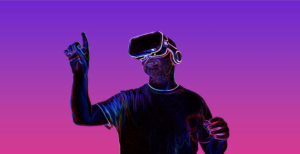Meeting Mentor Magazine
Let’s Meet in the Metaverse — Or Not?

Virtual reality may seem like the latest whiz-bang thing for meetings, but in fact, virtual reality technology has been around since the 1960s. Even the name “metaverse” was coined back in the early 1990s by Snow Crash author Neal Stephenson. The metaverse, where users create an avatar and enter a digital landscape is not new either. Gamers have been playing there for a while, and even gathered 12-million strong in Epic Games’ Fortnite metaverse platform in 2020 to watch an avatar of rapper Travis Scott perform.
But once Facebook’s parent company decided to rebrand as “Meta” last year and CEO Mark Zuckerberg started touting the metaverse as the next big thing, the concept has started popping up everywhere — and it’s being touted as the next big thing for meetings and events.
In fact, Microsoft Co-founder Bill Gates recently said he believes most virtual meetings will, within the next couple of years, “move from 2D camera image grids … to the metaverse, a 3D space with digital avatars.” Of course, Microsoft has virtual skin in the metaverse game, along with Meta and other major tech companies that are developing their own virtual platforms.
So what exactly is the metaverse, and will you be planning meetings and events there in the near future? We asked technical producer, educator, speaker, consultant and MeetingMentor event tech columnist Brandt Krueger to share his thoughts.

Event Tech Guru Brandt Krueger
MM: What is the metaverse, and why should meeting planners care?
Krueger: That’s difficult, because it’s being defined differently by different people. For some, it’s become a shorthand for “taking place in virtual reality (VR)” or a similar 3D environment. For others, it’s part of a larger view of the next generation of the Internet, which is why sometimes you’ll hear it along with the term Web3. This larger view not only includes VR, AR, XR and the worlds within them, including 3D avatars, outfits, locations, etc., but also things like AI, blockchain, and cryptocurrency. Those taking the larger view often are focused on principles of Universality and Decentralization. Here’s an article I think lays it out nicely.
I don’t personally think we’ll have any kind of universal metaverse any time soon. If it happens at all, we’re in the infancy stage and we’re building the infrastructure to support it right now. Anyone using the term right now is almost certainly doing it for marketing purposes, or they are referring to the shorter “it’s in VR” definition.
MM: Is the technology there yet to really make meetings and events in an immersive 3D virtual world practical?
Krueger: We’re pretty close, but like all venues it has to be for the right group. I’ve been partaking in a series of online events featuring different platforms, and the one that was the most 3D gamelike was the first time I heard anyone say they wanted to “talk to sales right now!” I wouldn’t have guessed that, and it actually happened twice in that demo.
MM: What do you see as the main benefits of meeting in the metaverse at this point in time? Biggest challenges?
Krueger: The benefits are the same as any online event — lower potential barrier of entry for attendees, exposure to larger worldwide audiences, the ability to support absurdly high attendee counts, and so much more. It’s just a different kind of venue.
Being such new technology, we’re still figuring out a lot of the norms around it. I attended an event where someone had clearly taken their headset off, but left their microphone engaged. There was no way to turn it off or let them know. Norms around bathroom breaks, or even just “need to take off this heavy headset for a bit” breaks have yet to be established, and worse, we’re already seeing the potential for harassment in “public” forums. Each “version” of the metaverse — Facebook, Google, Apple, or whoever else builds them such as software or gaming providers, will have their own rules regarding what’s allowed, personal boundary zones, etc.
The long and the short? We’re still figuring this stuff out. You don’t have to rush right out and book your metaverse event right now, but keep an eye on the technology, and keep taking demos as they come along. Online events were plunking along slowly until a pandemic forced us all online, and then the technology exploded. I can’t think of what would cause the same giant leap in VR tech, but you never know!
MORE ARTICLES FROM THIS ISSUE:
Design by: Loewy Design